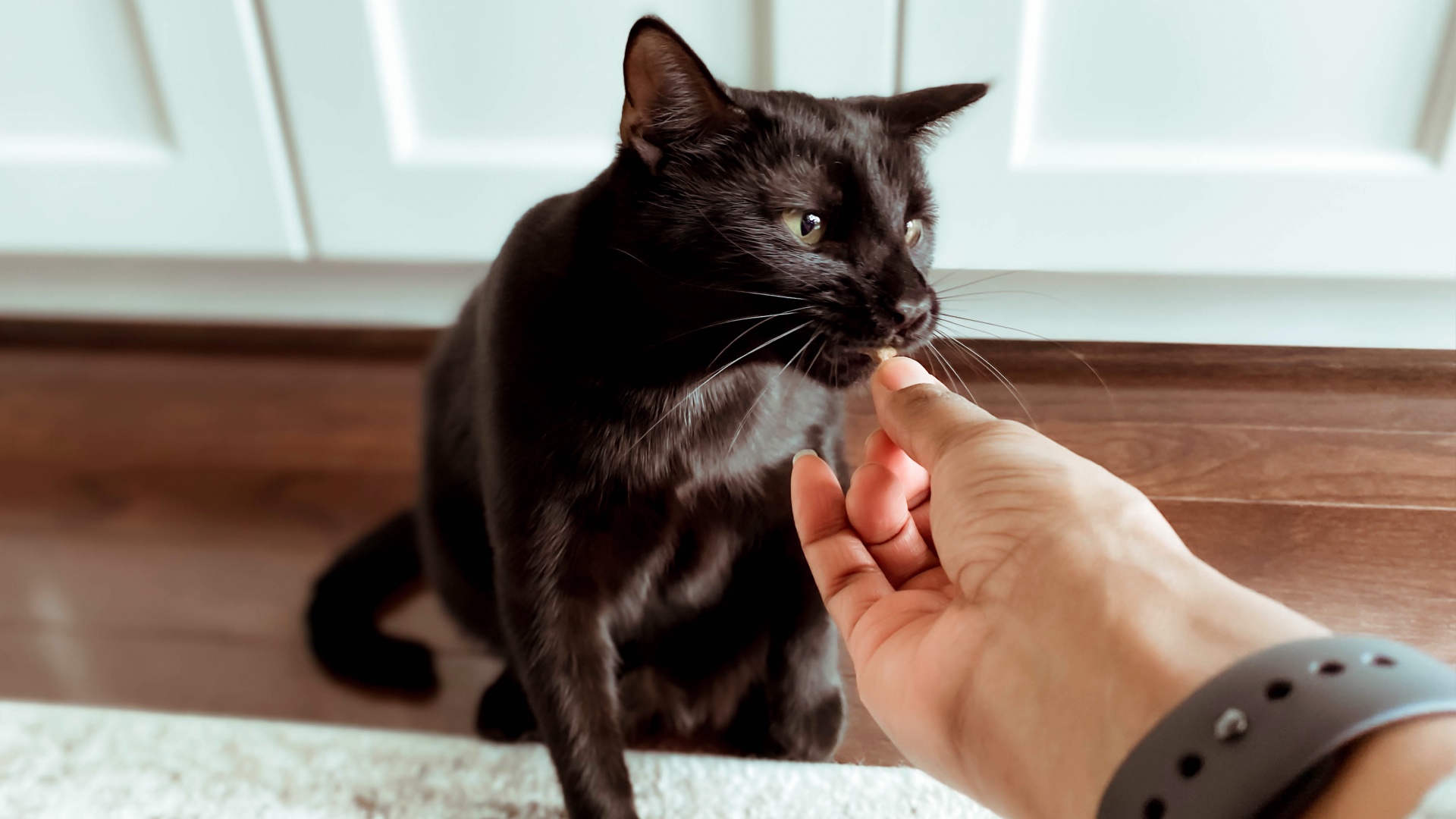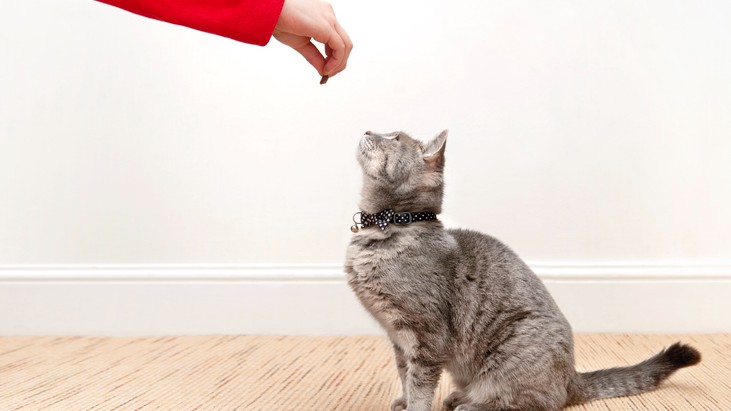Can cats eat dog treats? A vet's guide to whether dog treats are bad for cats
Pondering the question ‘can cats eat dog treats?’ Our vet reveals what doggy delicacies are safe for your feline friend to consume

Get the best advice, tips and top tech for your beloved Pets
You are now subscribed
Your newsletter sign-up was successful
Can cats eat dog treats? It’s a question you may have found yourself asking if you’re the proud pet parent to both a canine and a kitty. It would certainly be convenient, not to mention a money saver, if you could give your fur friends the same treats, but is it advisable to do so?
When it comes to the best cat treats and dog treats, although there is some overlap in the ingredients used, it’s worth noting that cats are carnivores and not omnivores like dogs. This means their treats tend to be very meat-centric as opposed to dog treats which feature things like fruits, vegetables and grains - things that cats don’t necessarily need in their diet.
Some dog treats also contain a number of ingredients that are toxic to cats, such as garlic and onions, so these products need to be avoided as they have the potential to cause health problems even when consumed in small quantities.
That being said, dog treats that don’t contain these harmful ingredients and don’t come with any warning label on the package stating they should not be fed to cats, will generally be safe for your kitty if they only eat one or two now and again.
To help you figure out exactly what dog treats your feline friend can and can’t consume, Dr. Hannah Godfrey reveals everything you need to know, including which treats are the best ones for your beloved bundle of fluff. Check out our guide to the best cat food or read on to find out what she has to say.
Can dogs and cats eat the same treats?
When it comes to pet food and treats, they tend to be specifically formulated for cats or dogs, not both. And for a good reason, because cats and dogs are very different. You might think that when it comes to nutrition, a cat is just a smaller, less noisy dog!
But in fact, the nutrients required by cats are slightly different from those a dog needs to be healthy. Therefore, both cat food and the best cat treats will vary from dog food and dog treats.
Get the best advice, tips and top tech for your beloved Pets
The main concerns with dog treats are that they sometimes contain small amounts of toxic ingredients that are safe for your dog but might not be for your cat. These ingredients are propylene glycol, ethylene glycol, onion, and garlic.
Why do dog treats contain small amounts of these potentially toxic ingredients?
It might seem odd that dog treats would contain an ingredient that is technically toxic, but the important thing to remember is that the amounts are so tiny that they are totally safe for your dog.
The reason why propylene glycol and ethylene glycol are used is to keep the treat tasting moist, ensuring it appeals to your pooch. Onions or garlic tend to be used as flavourings, again to tantalise your dog's tastebuds! Dog treats are tested to ensure they're safe for dogs, but without the same testing, you can't be sure they are safe for your favourite feline.
Can cats eat dog chews?
Dog chews, including antlers, bones, rawhide, and nylabones, are not a suitable treat for your kitty. It's unlikely that your cat would show much interest in a dog chew anyway! But if they did, it could cause damage to their teeth and mouth or even get stuck in their oesophagus.
Can cats eat dog jerky?
When compared to dog chews, dog jerky treats are a better alternative for your cat. This is because they have a softer texture, so they are less likely to break your cat's teeth. Most jerky treats don't contain any toxic preservatives or flavourings either, although it's still important to check just in case.
However, the tough nature of jerky could make it a choking hazard for your cat, so you should always keep an eye on your kitty if you decide to offer them a jerky treat. Remember, though, that there are plenty of safe cat treats available, so the risk of offering your cat a dog jerky treat might not be worth it.
Can cats eat soft dog treats and biscuit treats?

Soft treats and biscuit treats might also be appropriate for your cat if they don't contain any toxic ingredients. It's crucial to check the ingredients list for these types of treats because the softer texture is often caused by increased moisture, which might mean the addition of propylene glycol.
Most dog treats are unlikely to cause any harm to your cat, especially if they only eat a small amount. However, since the treats are aimed at dogs, they are not guaranteed to be safe for cats.
If your cat has eaten a dog treat, check the ingredients list to see if there are any concerning ingredients. It’s also worth keeping the packaging to show your veterinarian just in case. As long as your cat appears well and is showing no symptoms, you should monitor them closely. But if they become unwell, or you have any concerns, speak to your veterinarian.
Are there chew bones for cats?
Although there are a few chews for cats available, there are no safe chew bones for cats. If you want to encourage your cat to chew to keep their teeth healthy or even to keep them occupied while you’re out, chew toys might be a safer option.
So, what treats are best for my cat?
Cats don't need treats, and they certainly don't rely on them as much as dogs do. However, if you want to give your cat treats, either to train them or to spoil them a little, it's best to stick to specific cat treats. You could even use their dry food as a treat to prevent them from gaining too much weight. If you do decide to offer them the occasional dog treat, make sure you check the ingredients first so that your feline friend can indulge without worry! You could also follow this recipe on how to make cat treats.
Enjoyed this piece and looking for more helpful kitty content? Then be sure to check out our guide to what human food can cats eat? Or, Can cats eat strawberries?
What happens if my cat eats dog treats?

Hannah graduated from the Royal Veterinary College in 2011 and began work straight away at a busy mixed practice. Initially, she treated all species, but as the small animal hospital became busier, she focused on small animals from 2014. She has a passion for soft tissue surgery as well as canine and feline dentistry, having completed additional training in both areas. Since 2018, she has worked at a smaller, independent practice close to home, in order to devote more time to her other love – writing comedy fiction.
Dr Hannah Godfrey is a small animal vet who graduated from the Royal Veterinary College in 2011 and began work straight away at a busy mixed practice. Initially, she treated all species, but focussed on small animals from 2014. She has a passion for soft tissue surgery, ultrasound, and canine and feline dentistry, having completed additional training in these areas.
